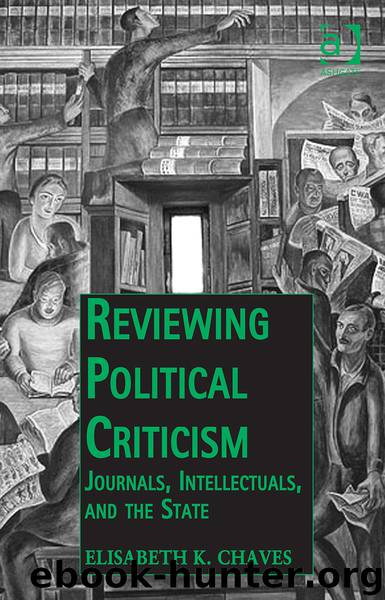Reviewing Political Criticism by Chaves Elisabeth K

Author:Chaves, Elisabeth K.
Language: eng
Format: epub
Publisher: Ashgate Publishing Ltd
Published: 2015-03-14T16:00:00+00:00
Negating “the Officially Available Nonsense”: The Story of Telos
Telos began in May 1968 as a fledgling student journal of radical philosophy on the campus of the State University of New York (SUNY)—Buffalo. Paul Piccone, the founding editor, stated that “[i]t is no accident that one of the early subtitles of Telos was ‘a journal definitely outside the mainstream of American philosophical thought’” (1988, p. 5). While the journal began as a forum for synthesizing philosophical thought, members of the editorial staff, notably Piccone, felt this purpose was insufficiently radical, and that the journal was “an amateurish microcosm of ‘professional’ philosophy,” and inferior to numerous others (Staff 1970, p. 295).15 By the second issue, Piccone was the only staff member remaining, and his vision for the journal included a different form of synthesis: namely, a merger of phenomenology with Western Marxism in an attempt to locate a new form of emancipatory politics that would “concretely negate the officially available nonsense” (Staff 1970, p. 295). Through Telos, Piccone also made clear his desire to introduce American readers to European and other foreign thinkers otherwise unnoticed in the United States. During the journal’s early years, its focus would range from phenomenology to Frankfurt School critical theory to French existentialism and post-structuralism and onto Euro-communism, to name but a few avenues explored by authors in Telos.
In 1968, SUNY-Buffalo’s philosophy department was the second largest in the country. However, the journal’s founders described themselves as “intellectually starved graduate students” who “sought a radical alternative” (Staff 1970, p. 294). For the journal’s founders, academia was not a productive setting for the type of philosophical and political thought that interested them. The journal’s strategy to place itself outside academia would cause many of its editors and contributors to live double-lives. Many wrote for a journal that garnered little favor in academic circles, especially when it came to tenure review, but held jobs within academia that increasingly required professionalization (Breines 1988; Jacoby 1981/82). This strategy of avoiding a home within academia turned into a fear of institutionalization of any sort. Piccone suggests that the strategy saved the journal from conformity (Piccone 1988). The journal “chose” to remain on the margins. Choice or not, this non-institutionalization, in academia or elsewhere, helped keep the journal distinct from other intellectual currents and publications. Since Telos was a student journal without much support, production was a low-budget affair. These two facts combined to make the journal appear amateurish. Importantly, as with The Public Interest, Telos’ foundational members were young, and many came from working-class and immigrant backgrounds. In both cases, it might be argued that this group’s entry into the public sphere as re-viewers of the state represents one of the “successes” of the redistributionary American welfare state.
The journal’s first editorial board consisted of five members and in the spirit of the age, appeared as a “collective.” By Issue 3, Piccone was sole “Editor,” alongside three associate editors, a review editor, and three staff members. With Issue 11 (Spring 1972), the total size of the Telos team numbered 24.
Download
This site does not store any files on its server. We only index and link to content provided by other sites. Please contact the content providers to delete copyright contents if any and email us, we'll remove relevant links or contents immediately.
| Anthropology | Archaeology |
| Philosophy | Politics & Government |
| Social Sciences | Sociology |
| Women's Studies |
The remains of the day by Kazuo Ishiguro(8961)
Tools of Titans by Timothy Ferriss(8357)
Giovanni's Room by James Baldwin(7313)
The Black Swan by Nassim Nicholas Taleb(7095)
Inner Engineering: A Yogi's Guide to Joy by Sadhguru(6780)
The Way of Zen by Alan W. Watts(6589)
Asking the Right Questions: A Guide to Critical Thinking by M. Neil Browne & Stuart M. Keeley(5747)
The Power of Now: A Guide to Spiritual Enlightenment by Eckhart Tolle(5738)
The Six Wives Of Henry VIII (WOMEN IN HISTORY) by Fraser Antonia(5492)
Astrophysics for People in a Hurry by Neil DeGrasse Tyson(5172)
Housekeeping by Marilynne Robinson(4429)
12 Rules for Life by Jordan B. Peterson(4298)
Double Down (Diary of a Wimpy Kid Book 11) by Jeff Kinney(4257)
The Ethical Slut by Janet W. Hardy(4235)
Skin in the Game by Nassim Nicholas Taleb(4229)
Ikigai by Héctor García & Francesc Miralles(4228)
The Art of Happiness by The Dalai Lama(4118)
Skin in the Game: Hidden Asymmetries in Daily Life by Nassim Nicholas Taleb(3983)
Walking by Henry David Thoreau(3946)
